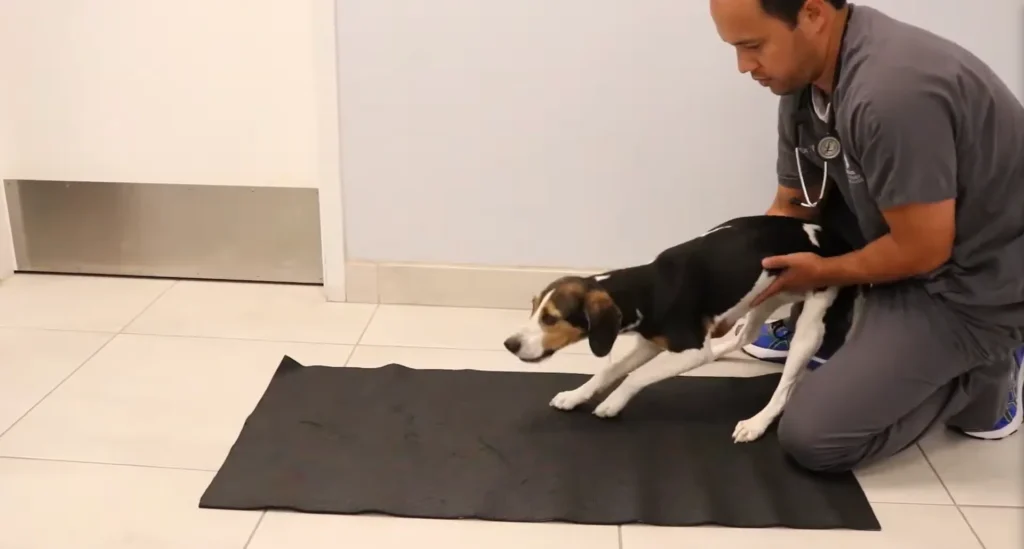Introduction
Meningitis is a serious health condition requiring prompt action. It is an inflammation of the meninges, which are protective coverings over the brain and spinal cord. Meningitis is usually joined by encephalitis (brain inflammation), creating a condition known as meningoencephalitis. Though uncommon, it is lethal if not treated. In the following article, we explain the causative factors, the symptoms, and the treatment for meningitis in dogs so that the pet owner can identify the condition early and act accordingly.
What is Meningitis in Dogs?
Meningitis is an inflammatory illness involving the central nervous system (CNS). The meninges are the protective covering of the brain and spinal cord, and when the covering becomes swollen, the dog’s nervous system can be put in danger. Meningitis in most instances is caused by infectious or immune-mediated conditions. It can happen to any dog, but there are breeds of dog that are genetically more likely to be affected by the condition.

Causes of Meningitis in Dogs
Meningitis in dogs can be caused by a multitude of factors. The factors are typically divided into two broad categories: infectious and non-infectious.
Infectious Causes
Infectious meningitis is when dangerous microorganisms such as bacteria, viruses, fungi, or protozoa infect the central nervous system. The infection can extend to the brain and spinal cord via the bloodstream or by direct extension from neighboring regions such as the ears, sinuses, or teeth.
Bacterial Infections
It is not very common for a dog to have bacterial meningitis, yet it can be a result of an infection elsewhere in the body, such as a tooth root abscess, ear infection, or injury. The most likely bacteria are Staphylococcus, Streptococcus, E. coli, and others. Bacterial meningitis is treated with broad-spectrum antibiotics.
Viral Infections
Canine distemper virus (CDV) is a leading viral cause of meningitis. Infection by this virus can cause encephalitis and meningitis in dogs. Other viruses like canine adenovirus, herpesvirus, and rabies also cause the same kind of symptoms. Prevention of viral meningitis can be achieved by vaccination against such viruses.
Fungal infections
Fungal meningitis is most commonly caused by the following endemic fungi: Cryptococcus, Blastomyces, Histoplasma, and Coccidioides. The breeds tend to be affected by these types of organisms more than others. Cocker Spaniels, for instance, are commonly affected by fungi infecting the CNS. The treatment is long-term medication with an antifungal agent such as itraconazole or fluconazole.
Protozoal and Parasitic Infections
Protozoans like Toxoplasma gondii and Neospora caninum can result in meningitis and encephalitis in canines. Neurological conditions can also be caused by heartworm illness when larvae migrate abnormally in the CNS. Specific anti-protozoal or antiparasitic drugs are used to treat such infections.
Non-Infectious Causes
In many instances of non-infectious meningitis in dogs, the immune system overreacts, causing immune-mediated inflammation. It is more prevalent in young dogs, especially particular breeds.
Steroid-Responsive Meningitis-Arteritis (SRMA)
SRMA is a leading cause of non-infectious meningitis in young dogs (6–18 months). SRMA is an immune-mediated condition that affects the meninges, causing intense pain in the neck as well as inflammation of the meningeal blood vessels. Beagles, Boxers, and Weimaraners are most susceptible. SRMA is usually treatable with corticosteroids, so early detection is essential for restoring health.
Meningoencephalitis of Unknown Origin (MUO)
Meningoencephalitis of Unknown Origin (MUO) MUO is a group of idiopathic immune-mediated CNS disorders that result in meningitis as well as encephalitis. Some of the conditions that fall under this category are Granulomatous Meningoencephalitis (GME), Necrotizing Meningoencephalitis (NME), and Necrotizing Leukoencephalitis (NLE). The conditions are prevalent in small breeds.
Other Immune-Mediated Disorders
Other Immune-Mediated Disorders Such conditions as Eosinophilic Meningoencephalitis and Greyhound Encephalitis are uncommon, though particular breeds of dogs are affected. They are conditions of inflammation induced by a hyperactive immune system attacking the body’s own tissues.

Symptoms of Meningitis in Dogs
Recognizing the symptoms of meningitis in dogs early can be crucial for effective treatment. Common signs of meningitis include:
- General Symptoms
- Fever
- Lethargy or weakness
- Loss of appetite
- Stiff neck or reluctance to move the head
- Muscle rigidity or tremors
- Sensitivity to touch or pain in the neck or spine
- Neurological Symptoms
- Seizures
- Circling or pacing
- Ataxia (lack of coordination)
- Weakness or paralysis
- Head tilt
- Loss of vision or facial paralysis
- Behavioral changes such as confusion or aggression
If your dog displays any combination of these symptoms, it’s important to seek veterinary care immediately. Early diagnosis and intervention are crucial for improving the chances of a full recovery.
Diagnosing Meningitis in Dogs
Diagnosing meningitis in dogs typically involves a combination of clinical examination, blood tests, imaging, and cerebrospinal fluid (CSF) analysis.
- Physical and Neurological Examination
A thorough physical examination is essential to assess pain, muscle stiffness, and neurological deficits. The vet will check for pain upon neck palpation and perform a neurological exam to look for signs of brain or spinal cord involvement. - Blood Tests
Blood work can help identify inflammation or underlying infections. For example, a complete blood count (CBC) may show an elevated white blood cell count, indicating infection or inflammation. - Imaging
X-rays can rule out fractures, tumors, or infections of the vertebrae. In some cases, an MRI is required to assess the extent of the inflammation in the brain and spinal cord. - Cerebrospinal Fluid (CSF) Analysis
A spinal tap or CSF analysis is the most definitive diagnostic tool. It helps identify whether the inflammation is due to an infection or immune-mediated process. The analysis will show cell counts, protein levels, and the presence of any infectious agents.
Treatment Options for Meningitis in Dogs
Treatment for meningitis in dogs depends on the underlying cause of the condition. Here are the most common treatment approaches:
- Infectious Meningitis
- Antibiotics: If a bacterial infection is diagnosed, broad-spectrum antibiotics will be administered, often intravenously, to control the infection.
- Antifungal Medications: For fungal infections, long-term antifungal therapy is necessary.
- Antiprotozoal Drugs: Specific medications like trimethoprim-sulfonamide are used to treat protozoal infections.
- Immune-Mediated Meningitis
- Corticosteroids: For non-infectious meningitis, particularly SRMA, corticosteroids like prednisone are the primary treatment. They help reduce inflammation and control the immune response.
- Immunosuppressive Drugs: In severe cases, additional immunosuppressants like azathioprine or cyclosporine may be used to reduce the steroid dosage and control inflammation.
- Supportive Care
Dogs with meningitis often require supportive care, including:- Pain management: Medications like gabapentin or opioids may be prescribed to manage pain.
- Fluids and Nutritional Support: IV fluids and proper nutrition are essential to support recovery.
- Seizure Control: If seizures occur, anticonvulsants such as phenobarbital or levetiracetam may be used.
Preventing Meningitis in Dogs
While not all cases of meningitis in dogs can be prevented, certain steps can help reduce the risk:
- Vaccination: Keep your dog up to date on core vaccinations like distemper, rabies, and parvovirus.
- Parasite Control: Preventive measures against ticks, fleas, and heartworms can reduce the risk of infections that cause meningitis.
- Good Hygiene: Treat ear infections and other underlying health issues promptly to prevent them from spreading to the CNS.
Conclusion
Meningitis in dogs is a serious but treatable condition. Early recognition of the symptoms and prompt veterinary care can significantly improve the prognosis. Whether the cause is infectious or immune-mediated, treatment options are available, including medications and supportive care. If you notice any signs of meningitis in your dog, such as neck pain, seizures, or behavioral changes, contact your veterinarian immediately for a thorough examination and treatment plan. By staying vigilant and proactive, you can help protect your dog’s health and ensure a better quality of life.
Top FAQs about Meningitis in Dogs
What causes meningitis in dogs?
Answer: Meningitis in dogs can be caused by both infectious agents (such as bacteria, viruses, and fungi) and non-infectious causes (including immune-mediated conditions like Steroid-Responsive Meningitis-Arteritis (SRMA)).
What are the three major causes of meningitis?
Answer: The three major causes of meningitis in dogs are bacterial infections, viral infections, and immune-mediated disorders.
Can a dog scratch cause meningitis?
Answer: A dog scratching itself is unlikely to cause meningitis. However, if the dog has an infected scratch or injury that spreads to the central nervous system, it could contribute to an infection that leads to meningitis.
How fatal is meningitis in dogs?
Answer: Meningitis can be fatal if not treated promptly. However, with early intervention, especially in immune-mediated cases like SRMA, the prognosis is generally good. Infections like Canine Distemper may have a higher fatality rate.
What is the survival rate for dogs with meningitis?
Answer: The survival rate for dogs with meningitis depends on the cause and timeliness of treatment. Dogs with bacterial meningitis, when treated promptly, have a good chance of recovery. Dogs with immune-mediated conditions like SRMA generally respond well to corticosteroids, with a good long-term prognosis.
How long before meningitis is fatal?
Answer: Meningitis can become fatal in a matter of days or weeks if left untreated, especially in cases caused by severe infections like Canine Distemper or if brain function is severely compromised.










